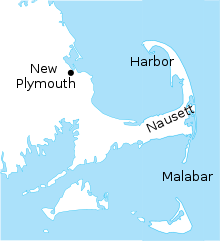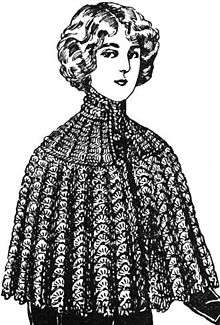Definify.com
Webster 1913 Edition
Cape
Cape
Cape
,Webster 1828 Edition
Cape
CAPE
,Definition 2026
Cape
Cape
English
Proper noun
Cape
- (with the definite article, South Africa) The Cape of Good Hope or Cape Province, South Africa
Translations
|
cape
cape
English

Noun
cape (plural capes)
- (geography) A piece or point of land, extending beyond the adjacent coast into a sea or lake; a promontory; a headland.
Synonyms
Derived terms
Translations
|
|
Etymology 2
From Old English capa, from Late Latin cappa (“cape”).

Noun
cape (plural capes)
- A sleeveless garment or part of a garment, hanging from the neck over the back, arms, and shoulders, but not reaching below the hips.
- 1977, Agatha Christie, An Autobiography, Part II, chapter4:
- Mind you, clothes were clothes in those days. […] Frills, ruffles, flounces, lace, complicated seams and gores: not only did they sweep the ground and have to be held up in one hand elegantly as you walked along, but they had little capes or coats or feather boas.
- 1977, Agatha Christie, An Autobiography, Part II, chapter4:
Translations
|
See also
Verb
cape (third-person singular simple present capes, present participle caping, simple past and past participle caped)
- (nautical) To head or point; to keep a course.
- The ship capes southwest by south.
- To skin an animal, particularly a deer.
Etymology 3
From Middle English capen (“to stare, gape, look for, seek”), from Old English capian (“to look”), from Proto-Germanic *kapjaną. Cognate with German gaffen (“to stare at curiously, rubberneck”), Low German gapen (“to stare”). Related to keep.
Verb
cape (third-person singular simple present capes, present participle caping, simple past and past participle caped)
- (obsolete) To look for, search after.
- Long may they search ere that they find that they after cape. (Geoffrey Chaucer)
- (rare, dialectal or obsolete) To gaze or stare.
- The captain just caped mindlessly into the distance as his ship was hit by volley after volley.
- This Nicholas ever caped upward into the air. (Geoffrey Chaucer)
References
Anagrams
French
Etymology
Borrowing from Old Provençal capa, from Late Latin cappa (compare the inherited doublet chape; cf. also the Old Northern French variant cape).
Pronunciation
Noun
cape f (plural capes)
Verb
cape
- first-person singular present indicative of caper
- third-person singular present indicative of caper
- first-person singular present subjunctive of caper
- first-person singular present subjunctive of caper
- second-person singular imperative of caper
Latin
Verb
cape
- second-person singular present active imperative of capiō
References
- CAPE in Charles du Fresne du Cange’s Glossarium Mediæ et Infimæ Latinitatis (augmented edition, 1883–1887)
Norwegian
Etymology
From English cape, from French, from Medieval Latin . Cognate with kappe (“cloak”), kåpe (“cloak”)
Noun
cape m
- cape (sleeveless garment used by women)
Inflection
References
Portuguese
Pronunciation
- Rhymes: -api
Verb
cape
- first-person singular (eu) present subjunctive of capar
- third-person singular (ele and ela, also used with você and others) present subjunctive of capar
- third-person singular (você) affirmative imperative of capar
- third-person singular (você) negative imperative of capar
Spanish
Verb
cape
- First-person singular (yo) present subjunctive form of capar.
- Formal second-person singular (usted) present subjunctive form of capar.
- Third-person singular (él, ella, also used with usted?) present subjunctive form of capar.
- Formal second-person singular (usted) imperative form of capar.